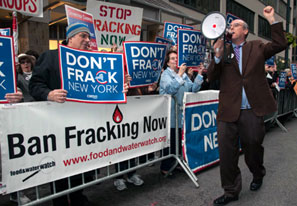
Citing unspecified concerns about health and the environment, Governor Andrew Cuomo announced this month that fracking (hydraulic fracturing) for natural gas is now banned in New York State. Some observers thought the governor might allow test drilling because economic growth from fracking in neighboring Pennsylvania has proved a boon. Though Cuomo seemed to distance himself (“I am not a scientist”) from the issue, a pro-fracking decision was never in the cards.
Since 2011, one of Cuomo’s closest fracking advisers has been Department of Environmental Conservation commissioner Joe Martens. An able and experienced administrator, Martens worked for Governor Mario Cuomo before serving 16 years as executive vice president and president of the rich and influential Open Space Institute (OSI). The OSI is closely linked to the 1.4 million-member National Resources Defense Council (NRDC) and other top organizations among America’s 26,000 environmental groups. Through direct purchase, loans, and easements, the OSI specializes in preserving open space, thereby preventing that space from being used for residential and commercial purposes. With OSI insider Martens effectively managing state policy, there is little chance that the natural gas bonanza lying beneath 28 of New York’s 62 counties will be developed.
The biggest losers from Cuomo’s thumbs down will be those who live and work in New York’s “Southern Tier”—the eight counties on the state’s 225-mile border with Pennsylvania. Poverty, unemployment, and dwindling population are endemic in this region. Between 2010 and October 2014, Southern Tier cities Elmira and Binghamton were the only urban areas in New York with shrinking economies.
Winners in New York’s farewell to fracking include the OSI and its allies in the ecology land-acquisition movement. The governor’s decision means the price of prime real estate in the Southern Tier will not spike. The vast supply of natural gas beneath the surface can only be commercially accessed by fracking. The land will therefore be worth much less than it would otherwise. Other winners include environmentalists who remain committed to costly, unreliable wind and solar power. They oppose clean, cheap, abundant natural gas, which tends to liberate consumers from environmental watchdogs.
Also on the winners list is Saudi Arabia, which is currently allowing oil prices to fall, a market-testing maneuver known in the petroleum business as “sweating.” A lower price for oil can sweat competing energy producers out of business. So far, the natural gas industry has weathered the economic pressure, but anything that reduces supply—such as New York’s fracking ban—is welcome news in the global energy field, not only to the Saudis but also to Russia. As the New York Times reported earlier this month, Russia is using intimidation and anti-fracking demonstrations to maintain its stranglehold on Europe’s energy supply. Whether Russia is bankrolling anti-fracking organizations in the U.S. is unknown.
Having convinced Albany that craps and blackjack equal economic development, the gaming industry is a winner, as well. On the same day the fracking decision was announced, a state board approved three new casinos in New York. Notably, none will be located in the struggling Southern Tier. Schenectady, a once-great manufacturing center, and two other locations in New York State will get glittering new “destination gaming resorts.” Despite growing evidence that casinos are a losing bet—so far this year, four casinos have closed in Atlantic City and a fifth is on life support—New York has decided to roll the dice on gambling and ignore its own data on the benefits of fracking.
A 2010 state report showed that high-volume hydrofracking would create more than 17,000 construction jobs and some 7,000 production jobs in New York, while adding 29,000 jobs in other sectors of the economy. In 2013, a Manhattan Institute study concluded that, based on Pennsylvania’s experience, “the income of residents in the 28 New York counties above the Marcellus Shale has the potential to expand by 15 percent or more over the next four years—if the state’s moratorium is lifted.”
But New York, where an increase in people moving away in search of opportunity contributed to the state’s recent fall from third to fourth in population, has chosen otherwise. In the name of imaginary threats to the environment, Albany will now deprive thousands of needy citizens of secure and prosperous futures, and offer them casinos instead. This is more than economic folly. It’s job thievery, in the first degree.